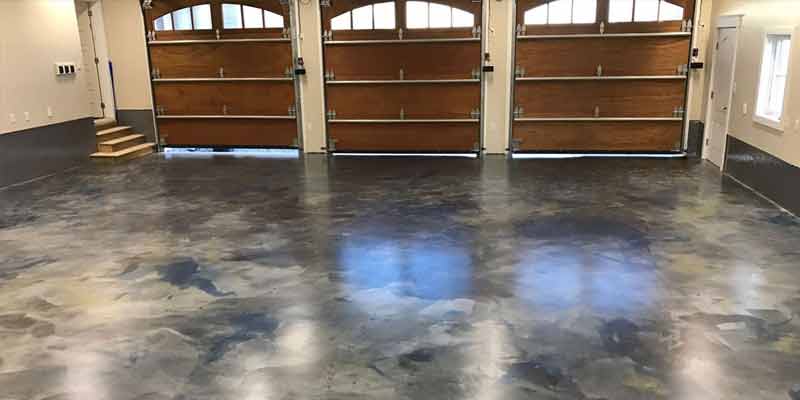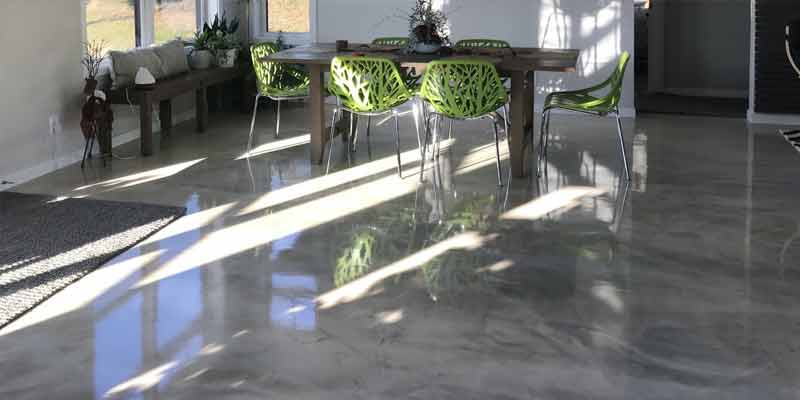While epoxy floors are extremely durable, they can be susceptible to damage if not installed correctly. One of the most important aspects of a successful epoxy flooring installation is choosing the right thickness level for your floor. In this guide, we will discuss the different epoxy flooring thickness levels and how to determine which one is right for your space.
Table of Contents
What is an Epoxy Floor?

Epoxy flooring is a type of floor coating that is composed of two parts: a resin and a hardener. When these two components are mixed together, they form a chemical reaction that creates a strong, durable, and long-lasting finish. Epoxy floors are often used in commercial and industrial settings because of their ability to resist wear and tear, as well as chemicals and other liquids.
There are three main types of epoxy flooring: 100% solid epoxy, solvent-based epoxy, and water-based epoxy. 100% solid epoxy is the most popular type of epoxy flooring because it is the most durable.
Solvent-based epoxies are less durable but have a faster cure time, while water-based epoxies are the least durable but have the longest cure time.
Epoxy Flooring Thickness Levels

There are three main thickness levels for epoxy floors: thin-mil, medium-mil, and thick-mil.
Thin-mil epoxy flooring is the thinnest type of epoxy available and is typically applied in a single coat. This type of epoxy is best suited for light foot traffic areas or spaces that do not require a lot of durabilities.
Medium-mil epoxy flooring is thicker than thin-mil epoxy and is typically applied in two coats. This type of epoxy is best suited for areas with moderate foot traffic or light vehicle traffic.
Thick-mil epoxy flooring is the thickest type of epoxy and is typically applied in three coats. This type of epoxy is best suited for areas with heavy foot traffic or heavy vehicle traffic.
How to Choose the Right Thickness Level
When choosing the right thickness level for your epoxy floor, you will need to consider the amount of traffic that your floor will be subjected to. The rule of thumb is that the thicker the epoxy, the more durable it will be.
If you are unsure of which thickness level to choose, we recommend consulting with a professional flooring contractor who can assess your space and make a recommendation based on your specific needs.
Important Factors to Remember
There are a few important factors to keep in mind when installing an epoxy floor:
- The surface must be clean and free of any dirt, dust, grease, or oil before the epoxy can be applied.
-The room temperature where the epoxy will be applied should be between 50-90 degrees Fahrenheit.
-The room's humidity level should be below 60% for optimal results.
- Epoxy floors should not be installed in rooms with high moisture levels, such as bathrooms or laundry rooms.
- Epoxy floors should not be installed in areas with a lot of direct sunlight, as this can cause the epoxy to yellow.
- It is important to allow the epoxy ample time to cure before walking or driving on it. The cure time will vary depending on the type of epoxy used, so be sure to consult the manufacturer's instructions for specific cure times.
By following these simple tips, you can ensure that your epoxy floor will be durable and long-lasting.
What Environments Should Not Have an Epoxy Floor?
There are a few environments where an epoxy floor would not be suitable. These include:
- Rooms with high moisture levels, such as bathrooms or laundry rooms
- Areas that are subject to a lot of direct sunlight
- Environments where chemicals are present
- Environments where there is a lot of dust
If you are unsure if an epoxy floor is suitable for your space, we recommend consulting with a professional flooring contractor.
What Are the Benefits of Epoxy Flooring?
There are many benefits to epoxy flooring, including:
- Increased durability
- Resistant to wear and tear
- Resistant to chemicals and other liquids
- Easy to clean and maintain
- Improved appearance
If you are looking for a durable and low-maintenance flooring option, epoxy flooring may be the right choice for you.
Are There Any Disadvantages to Epoxy Flooring?
There are a few disadvantages to epoxy flooring, including:
- Can be slippery when wet
- Requires a smooth, level surface for proper installation
- Not suitable for rooms with high moisture levels or direct sunlight
- Cure time can vary depending on the type of epoxy used
Before deciding if epoxy flooring is right for you, be sure to weigh the pros and cons.
Epoxy flooring is a popular choice for many homeowners and businesses due to its durability and easy maintenance. If you are considering epoxy flooring for your home or business, be sure to consult with a professional flooring contractor to discuss your specific needs.
If you have any questions about epoxy flooring or would like to learn more about our services, please contact us today. We would be happy to answer any of your questions and help you choose the right flooring solution for your space.

